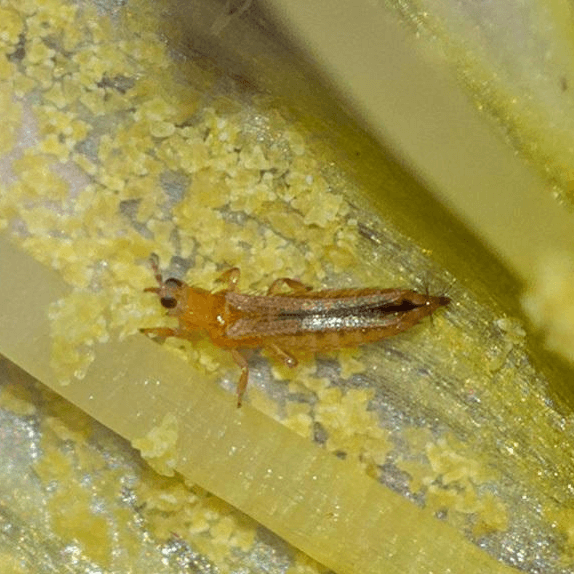Frankliniella occidentalis
western flower thrips
Frankliniella occidentalis is an invasive pest insect in agriculture. This species of thrips is native to the Southwestern United States but has spread to other continents, including Europe, Australia (where it was identified in May 1993), and South America via transport of infested plant material. It has been documented to feed on over 500 different species of host plants, including a large number of fruit, vegetable, and ornamental crops. The adult male is about 1 mm long; the female is slightly larger, about 1.4 millimetres (1⁄16 in) in length.
Host Genome
| Genome ID | Level | BUSCO Assessment |
|---|---|---|
| - | Scaffold |
C:98.0%[S:96.7%,D:1.3%],F:1.0%,M:1.0%,n:1367
|
Related Symbionts
2 recordsSymbiont records associated with Frankliniella occidentalis
| Classification | Function | Function Tags | Reference | |
|---|---|---|---|---|
|
Erwinia
Pseudomonadota |
Bacteria
|
Erwinia shortens the time to maturity and increases the oviposition rate (fertility and growth regulation). |
fertility
growth regulation
|
|
|
Pantoea agglomerans
Pseudomonadota |
Bacteria
|
Pantoea agglomerans is required for the normal development of the thrips Frankliniella occidentalis. |
developmental modulation
|
Metagenome Information
0 recordsMetagenome sequencing data associated with Frankliniella occidentalis
| Run | Platform | Location | Date | BioProject |
|---|---|---|---|---|
No metagenomes foundNo metagenome records associated with this host species. |
||||
Amplicon Information
0 recordsAmplicon sequencing data associated with Frankliniella occidentalis
| Run | Classification | Platform | Location | Environment |
|---|---|---|---|---|
No amplicons foundNo amplicon records associated with this host species. |
||||
Related Articles
2 recordsResearch articles related to Frankliniella occidentalis
| Title | Authors | Journal | Year | DOI |
|---|---|---|---|---|
|
Jin, G; Kim, Y
|
JOURNAL OF MICROBIOLOGY AND BIOTECHNOLOGY
|
2023
|
10.4014/jmb.2301.01018 | |
|
de Vries, EJ; Jacobs, G; Sabelis, MW; Menken, SBJ; Breeuwer, JAJ
|
Proceedings. Biological Sciences
|
2004
|
10.1098/rspb.2004.2817 |